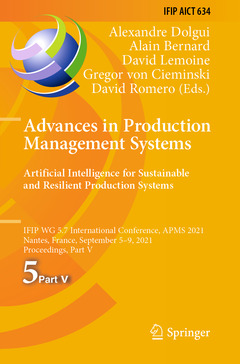Advances in Production Management Systems. Artificial Intelligence for Sustainable and Resilient Production Systems, 1st ed. 2021 IFIP WG 5.7 International Conference, APMS 2021, Nantes, France, September 5–9, 2021, Proceedings, Part V IFIP Advances in Information and Communication Technology Series, Vol. 634
Coordonnateurs : Dolgui Alexandre, Bernard Alain, Lemoine David, von Cieminski Gregor, Romero David

The 378 papers presented were carefully reviewed and selected from 529 submissions. They discuss artificial intelligence techniques, decision aid and new and renewed paradigms for sustainable and resilient production systems at four-wall factory and value chain levels. The papers are organized in the following topical sections:
Part I: artificial intelligence based optimization techniques for demand-driven manufacturing; hybrid approaches for production planning and scheduling; intelligent systems for manufacturing planning and control in the industry 4.0; learning and robust decision support systems for agile manufacturing environments; low-code and model-driven engineering for production system; meta-heuristics and optimization techniquesfor energy-oriented manufacturing systems; metaheuristics for production systems; modern analytics and new AI-based smart techniques for replenishment and production planning under uncertainty; system identification for manufacturing control applications; and the future of lean thinking and practice
Part II: digital transformation of SME manufacturers: the crucial role of standard; digital transformations towards supply chain resiliency; engineering of smart-product-service-systems of the future; lean and Six Sigma in services healthcare; new trends and challenges in reconfigurable, flexible or agile production system; production management in food supply chains; and sustainability in production planning and lot-sizing
Part III: autonomous robots in delivery logistics; digital transformation approaches in production management; finance-driven supply chain; gastronomic service system design; modern scheduling and applications in industry 4.0; recent advances in sustainable manufacturing; regular session: green production and circularity concepts; regular session: improvement models and methods for green and innovative systems; regular session: supply chain and routing management; regular session: robotics and human aspects; regular session: classification and data management methods; smart supply chain and production in society 5.0 era; and supply chain risk management under coronavirus
Part IV: AI for resilience in global supply chain networks in the context of pandemic disruptions; blockchain in the operations and supply chain management; data-based services as key enablers for smart products, manufacturing and assembly; data-driven methods for supply chain optimization; digital twins based on systems engineering and semantic modeling; digital twins in companies first developments and future challenges; human-centered artificial intelligence in smart manufacturing for the operator 4.0; operations management in engineer-to-order manufacturing; product and asset life cycle management for smart and sustainable manufacturing systems; robotics technologies for control, smart manufacturing and logistics; serious games analytics: improving games and learning support; smart and sustainable production and supply chains; smart methods and techniques for sustainable supply chain management; the new digital lean manufacturing paradigm; and the role of emerging technologies in disaster relief operations: lessons from COVID-19
Part V: data-driven platforms and applications in production and logistics: digital twins and AI for sustainability; regular session: new approaches for routing problem solving; regular session: improvement of design and operation of manufacturing systems; regular session: crossdock and transportation issues; regular session: maintenance improvement and lifecycle management; regular session: additive manufacturing and mass customization; regular session: frameworks and conceptual modelling for systems and services efficiency; regular session: optimization of production and transportation systems; regular session: optimization of supply chain agility and reconfigurability; regular session: advanced modelling approaches; regular session: simulation and optimization of systems performances; regular session: AI-based approaches for quality and performance improvement of production systems; and regular session: risk and performance management of supply chains
*The conference was held online.
Date de parution : 09-2022
Ouvrage de 657 p.
15.5x23.5 cm
Disponible chez l'éditeur (délai d'approvisionnement : 15 jours).
Prix indicatif 147,69 €
Ajouter au panierDate de parution : 09-2021
Ouvrage de 657 p.
15.5x23.5 cm
Thèmes d’Advances in Production Management Systems. Artificial... :
Mots-clés :
artificial intelligence; business models; cad; computer networks; computer-aided design; correlation analysis; data communication systems; electronic commerce; industrial engineering; industry 4.0; information technology; internet; manufacturing engineering; network protocols; product design; signal processing; software engineering; telecommunication networks; telecommunication traffic; user interfaces



